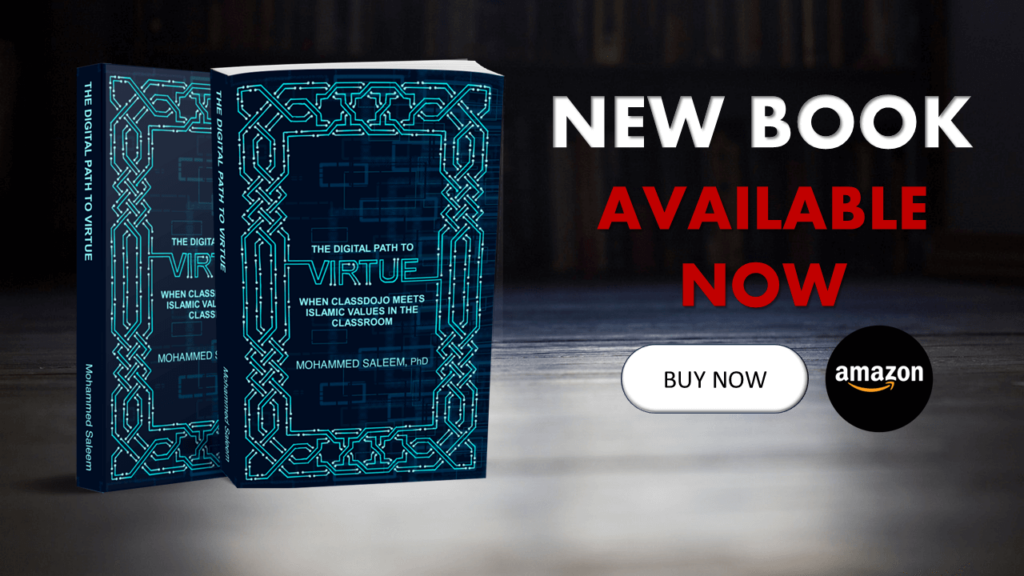About educateMuslims.com

Why educateMuslims.com?
The challenges Muslim children face in this postmodern age pose an existential threat to their identity. This blog explores topics in education from an Islamic angle to find holistic ways to empower children to live as Muslims.
Our role models are the Prophet Muhammad ﷺ and his companions.“Iqra! Read, in the name of your Lord who created you,” was the first command given by Allah to Prophet Muhammad ﷺ.
By obeying this command, the first generation of Muslims sparked a revolution that transformed a society drowning in many darknesses. It became a beacon of light and guidance for the rest of humanity.
How can we achieve the same results? This is the question we explore in all our posts.
As we explore different topics in the education of Muslim children, we ask, “WWMD?” – What would Muhammad ﷺ do?
The Framework
Our work is guided by the concept of tawhid, the Islamic worldview and the epistemological framework that is summarized by the testament of Iman (faith):
لَا إِلَٰهَ إِلَّا ٱللَّٰهُ مُحَمَّدٌ رَسُولُ ٱللَّٰهِ
lā ʾilāha ʾillā llāhu muḥammadun rasūlu llāhi
There is no God but Allah and Muhammad ﷺ is the messenger of Allah.
Tawhid, the unifying concept of monotheism in Islam, lays out six articles of faith that form a Muslim’s worldview:
- Belief in the Oneness of God.
- Belief in the angels.
- Belief in revealed scriptures or holy books.
- Belief in prophets and messengers.
- Belief in the Day of Judgment.
- Belief in the Divine Decree.
How we know what we know, how we determine what we know is useful or not, and how to implement what is useful is informed by the Quran and the Sunnah of Prophet Muhammad (ﷺ), the two primary sources in Islam.
Content and Organization
The posts are casual in nature. Sometimes they are just reflections of observations and experiences. At other times they are more in depth, borrowing from contemporary research in education, surveys, interviews, discussions, and artifacts.
We follow the tarbiyah approach in organizing all content. The tarbiyah approach is a dynamic learning and self-developmental approach found in the Quran and Sunnah. There are three processes involved in the tarbiyah approach:
- Tilawah (Engage): Posts that focus on raising awareness of contemporary issues and challenges, identification and acceptance of gaps in our understanding, and how we should orient ourselves on the topic in terms of the Qur’an and Sunnah.
- Tazkiyah (Purification): Posts that are action oriented and seek to correct skewed perspectives and misconceptions.
- Ta’lim (Deep Dives): Posts that take a deeper dive through research and investigation. These posts seek deeper insights by making connections across multiple disciplines to develop ideas and tools that can be used in many ways. These ideas are then connected with the Qur’an and Sunnah.
Posts may include one or more or a combination of the above three processes. All posts conclude with a call to action by asking: “WWMD?” – What would Muhammad ﷺ do?
Our Logo
The logo captures the main focus of our posts; i.e. education of Muslim children. The pen reminds us of the legacy of learning referred to in the first five verses of Chapter 96 of the Quran:
ٱقۡرَأۡ بِٱسۡمِ رَبِّكَ ٱلَّذِى خَلَقَ (١) خَلَقَ ٱلۡإِنسَـٰنَ مِنۡ عَلَقٍ (٢) ٱقۡرَأۡ وَرَبُّكَ ٱلۡأَكۡرَمُ (٣) ٱلَّذِى عَلَّمَ بِٱلۡقَلَمِ (٤) عَلَّمَ ٱلۡإِنسَـٰنَ مَا لَمۡ يَعۡلَمۡ (٥)
In the name of Allah, the Gracious, the Merciful. 1. Read: In the Name of your Lord who created. 2. Created man from a clot. 3. Read: And your Lord is the Most Generous. 4. He who taught by the pen. 5. Taught man what he never knew. 1
These were the first verses revealed to Prophet Muhammad ﷺ that established the foundations of his ﷺ mission on knowledge and learning.

